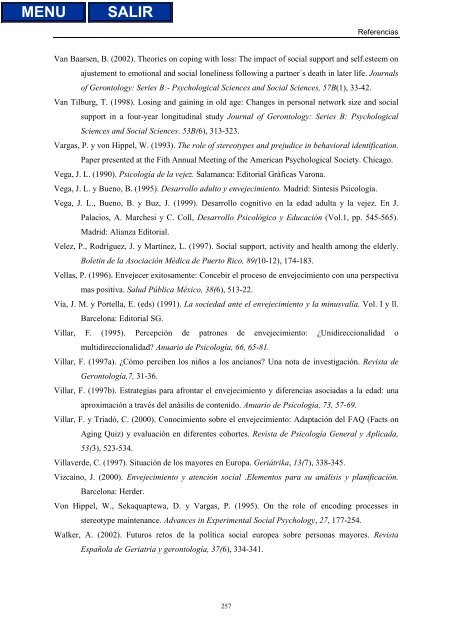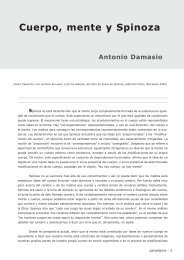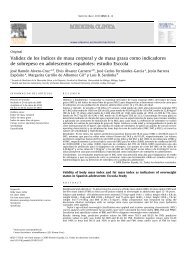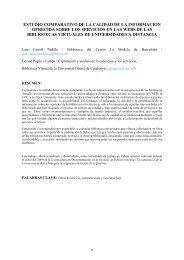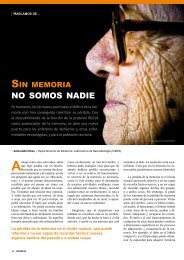Estereotipos negativos hacia la vejez y su relación con variables ...
Estereotipos negativos hacia la vejez y su relación con variables ...
Estereotipos negativos hacia la vejez y su relación con variables ...
You also want an ePaper? Increase the reach of your titles
YUMPU automatically turns print PDFs into web optimized ePapers that Google loves.
Referencias<br />
Van Baarsen, B. (2002). Theories on coping with loss: The impact of social <strong>su</strong>pport and self.esteem on<br />
ajustement to emotional and social loneliness following a partner´s death in <strong>la</strong>ter life. Journals<br />
of Gerontology: Series B:- Psychological Sciences and Social Sciences, 57B(1), 33-42.<br />
Van Tilburg, T. (1998). Losing and gaining in old age: Changes in personal network size and social<br />
<strong>su</strong>pport in a four-year longitudinal study Journal of Gerontology: Series B: Psychological<br />
Sciences and Social Sciences. 53B(6), 313-323.<br />
Vargas, P. y von Hippel, W. (1993). The role of stereotypes and prejudice in behavioral identification.<br />
Paper presented at the Fith Annual Meeting of the American Psychological Society. Chicago.<br />
Vega, J. L. (1990). Psicología de <strong>la</strong> <strong>vejez</strong>. Sa<strong>la</strong>manca: Editorial Gráficas Varona.<br />
Vega, J. L. y Bueno, B. (1995). Desarrollo adulto y envejecimiento. Madrid: Síntesis Psicología.<br />
Vega, J. L., Bueno, B. y Buz, J. (1999). Desarrollo cognitivo en <strong>la</strong> edad adulta y <strong>la</strong> <strong>vejez</strong>. En J.<br />
Pa<strong>la</strong>cios, A. Marchesi y C. Coll, Desarrollo Psicológico y Educación (Vol.1, pp. 545-565).<br />
Madrid: Alianza Editorial.<br />
Velez, P., Rodríguez, J. y Martínez, L. (1997). Social <strong>su</strong>pport, activity and health among the elderly.<br />
Boletin de <strong>la</strong> Asociación Médica de Puerto Rico, 89(10-12), 174-183.<br />
Vel<strong>la</strong>s, P. (1996). Envejecer exitosamente: Concebir el proceso de envejecimiento <strong>con</strong> una perspectiva<br />
mas positiva. Salud Pública México, 38(6), 513-22.<br />
Vía, J. M. y Portel<strong>la</strong>, E. (eds) (1991). La sociedad ante el envejecimiento y <strong>la</strong> minusvalía. Vol. I y ll.<br />
Barcelona: Editorial SG.<br />
Vil<strong>la</strong>r, F. (1995). Percepción de patrones de envejecimiento: ¿Unidireccionalidad o<br />
multidireccionalidad? Anuario de Psicología, 66, 65-81.<br />
Vil<strong>la</strong>r, F. (1997a). ¿Cómo perciben los niños a los ancianos? Una nota de investigación. Revista de<br />
Gerontología,7, 31-36.<br />
Vil<strong>la</strong>r, F. (1997b). Estrategias para afrontar el envejecimiento y diferencias asociadas a <strong>la</strong> edad: una<br />
aproximación a través del anásilis de <strong>con</strong>tenido. Anuario de Psicología, 73, 57-69.<br />
Vil<strong>la</strong>r, F. y Triadó, C. (2000). Conocimiento sobre el envejecimiento: Adaptación del FAQ (Facts on<br />
Aging Quiz) y evaluación en diferentes cohortes. Revista de Psicología General y Aplicada,<br />
53(3), 523-534.<br />
Vil<strong>la</strong>verde, C. (1997). Situación de los mayores en Europa. Geriátrika, 13(7), 338-345.<br />
Vizcaíno, J. (2000). Envejecimiento y atención social .Elementos para <strong>su</strong> análisis y p<strong>la</strong>nificación.<br />
Barcelona: Herder.<br />
Von Hippel, W., Sekaquaptewa, D. y Vargas, P. (1995). On the role of encoding processes in<br />
stereotype maintenance. Advances in Experimental Social Psychology, 27, 177-254.<br />
Walker, A. (2002). Futuros retos de <strong>la</strong> política social europea sobre personas mayores. Revista<br />
Españo<strong>la</strong> de Geriatría y gerontología, 37(6), 334-341.<br />
257


